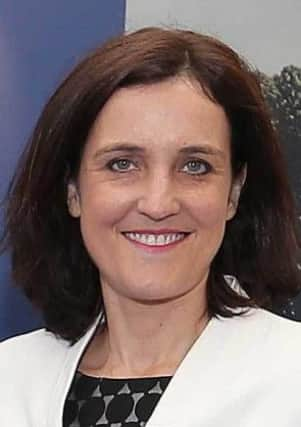Northern Ireland conflict: Theresa Villiers defends the role of British security forces


In a speech made this morning in Belfast the SoS delivered a strong defence of British security forces whom she claimed had fought to preserve law and order in Northern Ireland said many of them had paid with their lives in doing so.
Ms Villiers also warned that thise who defend the murderous activities of paramilitaries during the ‘Troubles’ are risking placing a “spurious legtimacy” to current terrorist violence.
Advertisement
Hide AdAdvertisement
Hide AdAddressing a gathering at Ulster University which included criminologists and political academics, Ms Villiers said that without the dedication of the security forces “the circumstances that enabled the peace process to take root would never have happened.”
She said: “ Yet today we face a pernicious counter narrative.
“It is a version of the Troubles that seeks to displace responsibility from the people who perpetrated acts of terrorism and place the State at the heart of nearly every atrocity and murder that took place - be it through allegations of collusion, misuse of agents and informers or other forms of unlawful activity.
“For some, every allegation of wrongdoing by the State - or those working for it - is treated as fact, however unsubstantiated or whatever the source and whatever the consequential distress to victims.”
Advertisement
Hide AdAdvertisement
Hide AdMs Villiers accepted that over the decades of the Troubles there were some “truly shocking instances” where the security forces “fell drastically short” of those standards to which they should be held.
She went on: “That includes the appalling murder of Patrick Finucane, the anniversary of whose death takes place tomorrow.
“And like the Prime Minister I will never seek to defend the security forces by defending the indefensible.
“Where there is evidence of wrongdoing it will be pursued. Everyone is subject to the rule of law. Yet we need to be mindful of the context in which the security forces were operating.
Advertisement
Hide AdAdvertisement
Hide Ad“While we will always judge our security forces against the highest standards of integrity and professionalism, both then and now … we do need to recognise that policing practice and methodology has changed radically over the intervening years, right across the UK.”
“We should therefore be wary of expecting modern investigatory practices to have been applied in past decades, lest we become guilty of historical anachronism.
“We should also be conscious that gathering and assessing intelligence is not, and never will be, an exact science. It varies greatly in quality, clarity and reliability. Assessing its credibility can frequently involve finely balanced judgements.
“What might seem to have a certain meaning with hindsight, at the time could well have been just one of a long list of conflicting and vague reports all pointing in different directions.”
Advertisement
Hide AdAdvertisement
Hide AdMs Villiers said that “no injustice - perceived or otherwise - warranted the violent actions of the paramilitary groups” and vowed: “We will never agree with a version of history that seeks to legitimise them.”
She added: “As the Government’s Northern Ireland manifesto at the election emphasised we wholly reject any suggestion of equivalence between the security forces and those who carried out acts of terrorism.
“And I believe that there is a real risk that those who seek to justify the terrorist violence of the past risk giving a spurious legitimacy to the terrorist violence of the present.”
Ms Villiers said that a key reason why terrorism failed in Northern Ireland “the remarkable dedication, professionalism and courage of the Royal Ulster Constabulary and the Armed Forces”.
Advertisement
Hide AdAdvertisement
Hide AdThe Secretary of State added: “The Government fully recognises that it will be much more difficult to achieve our objective of building a genuinely shared future for everyone in Northern Ireland unless and until we can find some way of coming to terms with a divided past...It is not an area where we can ever achieve a consensus view on what happened.”